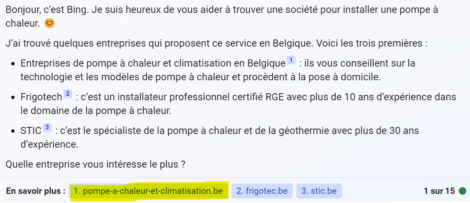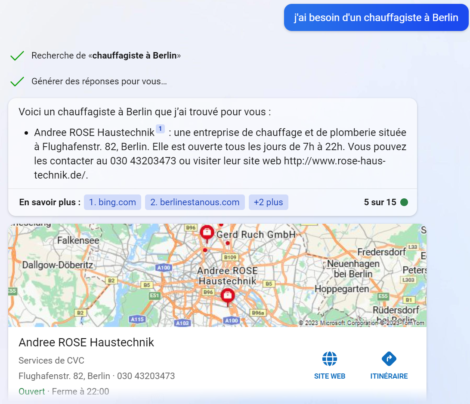ChatGPT and other conversational agents powered by generative AI present a risk for SEO and inbound marketing. This risk is that your website will be less visited because users will turn away from Google. Even if I don’t believe in Microsoft’s predictions, the risk exists, especially since the release of GPT-4 and its immediate integration into Bing.
I share with you in the following paragraphs the 6 actions I have started to implement to protect my inbound marketing.
Contact our inbound marketing agency

Collect customer reviews to influence Bing
“Recommend a company that does X or Y and has a good reputation.” That’s a typical request that might come to ChatGPT in the next few months. And where do you think it will get its answers? From Google reviews, Trustpilot, and all their equivalents.
ChatGPT’s answers to such questions could be much better and more balanced. But GPT will undoubtedly improve (especially with version 4) and better identify the most relevant information.
Suggestion #1
Immediately set up an action plan to collect customer reviews via all possible channels (not just Google Business). You have a few months to motivate your customers to leave positive reviews.
Ask Bing and ChatGPT questions to understand where the customer reviews they use come from. Target that particular website(s) to get your customers to leave reviews.
Identify the pages Bing uses to formulate responses
Bing is very clear about its sources when recommending companies to you. They appear at the bottom of the response. In the example below, I have highlighted one of the sources. It is not a company’s website but a directory of professionals. This website is, therefore, part of the GPT-3 training data, and it is in your interest to appear there.
Suggestion #2
Test Bing, identify the comparison engines used to recommend companies and register on these websites. If they offer the possibility of lea a review, encourage your customers to do so (see previous paragraph).
List your company in the Bing directory
Bing has a company directory equivalent to that of Google Business. Therefore, from this directory (and not the Google one), the suggestions of companies will be collected in priority. It is therefore essential that you appear there. But the probability is high that you need to take the time to register.
Fortunately, it is possible to remedy this easily by connecting Bing to your Google Business listing. However, you might be surprised to discover that the country where your business is located needs to be supported. This is the case in France, for example. In our case, we cannot manage the Bing Local listing of our French subsidiary.
The Bing conversational agent, based on GPT-4, displays information from the Bing Local directory.
Suggestion #3
Log in to Bing Local and link your Google Business account to have your locations imported directly. If you are in a country not covered by Bing Local, suggest an additional location.
Diversify your content formats to influence Bing
Conversational agents produce text. This will change with the arrival of GPT-4, but it is reasonable to assume that 99% of users will use ChatGPT and its competitors to interact in text form. Audio and video content are not likely to be challenged by ChatGPT or Bing. So these formats need to be even more a part of inbound marketing strategies in the future.
As I explained in this article, 2023 is a pivotal year to invest in diversifying your content, especially podcasting (especially because of the low entry costs). Indeed, a (probably minimal) part of the classic searches will be absorbed by Bing. But users looking for alternative formats to text will still turn to YouTube, Spotify, and other specialized platforms.
Suggestion #4
If you have the opportunity, invest a little of your marketing budget in creating a few podcast episodes or short videos. Podcasts, in particular, are relatively inexpensive.
Connect directly with your prospects
I can’t stress enough that the solution to your lead generation problems is to connect directly with your prospects. The more you depend on intermediaries, the more your business is at the mercy of rules set by others (especially algorithmic rules).
As I shared here, newsletters will experience a new golden age. They are a very effective way to build loyalty and stay in the minds of your prospects.
Suggestion #5
Place a newsletter subscription field on the most visited pages of your website as soon as possible. You must attract as many people as possible (in compliance with the GDPR) even if your newsletter is still unready.
Produce content to stand out in conversational agents
If your company uses search engines to find customers, you’ll also need to produce content to appear in conversational agents. ChatGPT is opaque and does not cite its sources. On the other hand, Bing shows the URL of the websites used to answer your question.
Neural networks always produce different answers (although very similar, as I have shown in this research). Compared to a classic search engine, there is, however, a major problem. Unlike Google, where the results are more or less stable over lengthy periods, with generative AI, there is no stability.
So there is no assurance of appearing in the responses of conversational agents because:
- you are not sure that your website will be tracked and included in the training data
- you don’t know in advance which “path” the answer will take through the neural network
Suggestion #6
Ensure you identify the keywords that bring you leads from those that only bring you traffic. Create content that corresponds to the queries that will bring you qualified leads. If you need help, don’t hesitate to contact us.
Posted in Strategy.







